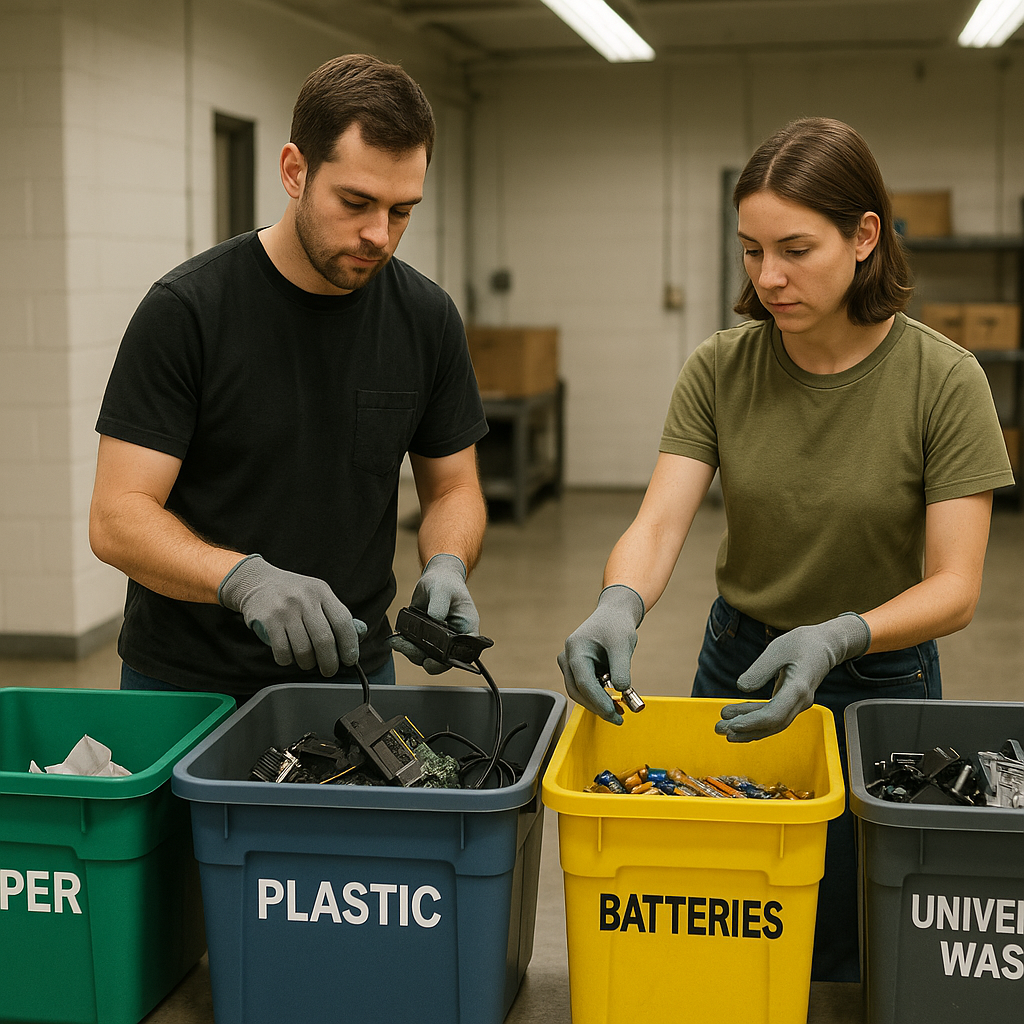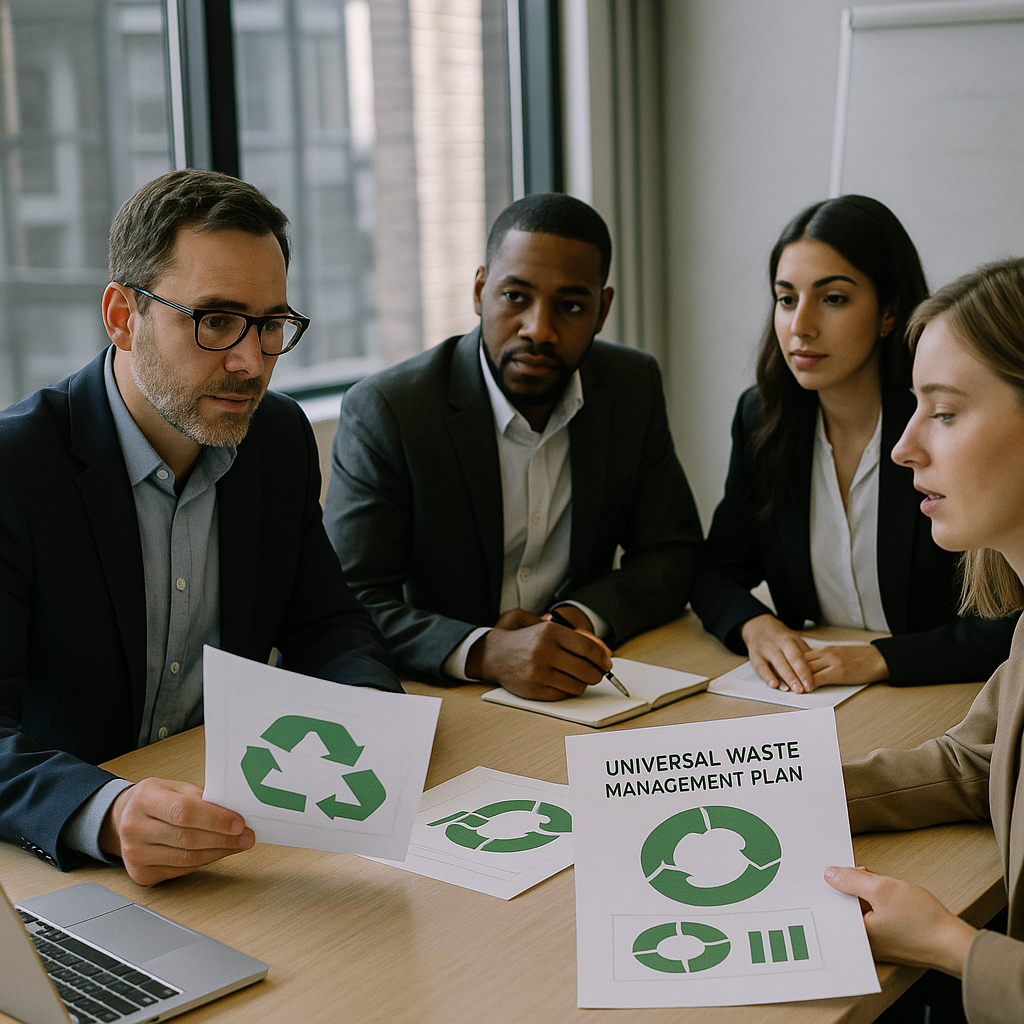5901 Botham Jean Blvd, Dallas, TX 75215
What is Universal Waste and Why is it Important?
August 1, 2025Every day, businesses across the United States generate hazardous materials that need special handling. Common items like the batteries powering equipment and the fluorescent lights illuminating offices contain substances that can harm the environment if improperly discarded.
Universal waste is a regulatory category created by the Environmental Protection Agency (EPA) that covers specific hazardous waste streams produced by various businesses. These include batteries, pesticides, mercury-containing equipment, fluorescent lamps, and in some states, electronics and aerosol cans. In 2023 alone, over 350 million tons of hazardous waste were generated in the US, with universal waste comprising a significant portion.
The EPA established the universal waste rule in 1995 to simplify the management process for these items. This streamlined approach has three clear goals: to promote collection and recycling of these materials, reduce regulatory burdens on businesses, and prevent these hazardous items from ending up in landfills, where they can leach toxins into soil and water sources. For US businesses, understanding these regulations isn’t just about environmental stewardship—it’s about legal compliance and avoiding potentially significant penalties.
What Types of Universal Waste Do Businesses Commonly Generate?
Businesses across various sectors often generate universal waste during their daily operations. Although these waste streams contain hazardous materials, they are subject to less stringent regulations to encourage proper recycling and disposal. Here are the main types of universal waste that businesses commonly generate:
- Batteries – Various types of batteries can leach heavy metals into soil and water if improperly disposed of. Common examples include:
- Lead-acid automotive batteries (typical in transportation and automotive industries)
- Nickel-cadmium rechargeable batteries (used in power tools and emergency lighting)
- Lithium-ion batteries (found in electronics, mobile devices, and electric vehicles)
- Fluorescent Lamps and Mercury-Containing Bulbs – These lighting products contain mercury vapor, which can be released if broken. Businesses using these include:
- Office complexes (fluorescent ceiling lights)
- Retail establishments (display lighting)
- Hospitals and healthcare facilities (high-intensity discharge lamps)
- Manufacturing plants (metal halide and high-pressure sodium lamps)
- Mercury-Containing Equipment – Devices with elemental mercury pose health risks when improperly handled, including:
- Thermostats (in commercial buildings and older facilities)
- Pressure gauges and measuring devices (common in utilities and industrial settings)
- Electrical switches and relays (used in electrical systems)
- Medical devices like thermometers and barometers (healthcare settings)
- Pesticides – Certain pesticides become universal waste when recalled, banned, or accumulated as waste:
- Agricultural operations (unused or expired crop treatments)
- Landscaping companies (herbicides and insecticides)
- Property management firms (pest control products)
- Food processing facilities (pest management chemicals)
- Aerosol Cans – Added to federal universal waste regulations in 2019, these contain propellants and chemicals that can be hazardous:
- Manufacturing operations (lubricants and cleaning sprays)
- Automotive repair shops (brake cleaners and degreasers)
- Maintenance departments (paints and solvents)
- Printing facilities (adhesives and specialized coatings)
- Electronic Waste – While not federally listed, many states categorize electronics as universal waste due to their hazardous components:
- IT departments (computers, monitors, and peripherals)
- Telecommunications companies (networking equipment)
- Healthcare providers (specialized medical electronics)
- Educational institutions (classroom technology)
In some states, additional items may be classified as universal waste. For instance, paint and paint-related waste are regarded as universal waste in Texas and Ohio, while California and Hawaii include photovoltaic panels. Businesses should consult both federal EPA regulations and their state’s specific requirements to ensure proper identification and management of their universal waste streams.
Proper identification of universal waste streams is a crucial step toward compliance with environmental regulations. By understanding the types of universal waste your business generates, you can implement suitable collection, storage, and disposal procedures to protect both the environment and your company from liability.
What are the Best Practices for Universal Waste Recycling and Disposal?

Recycling universal waste significantly benefits the environment and helps businesses comply with regulations. By adopting sound management practices, organizations can reduce their environmental footprint while ensuring full regulatory compliance.
Partner with Certified Recycling Facilities
Businesses should establish relationships with certified recycling facilities or authorized universal waste handlers. These partners possess the necessary permits, equipment, and expertise to manage universal waste correctly. When selecting a recycling partner, ensure they have the proper certification and comply with all regulatory requirements.
Certified facilities use specialized processes to recover valuable materials from universal waste. For instance, batteries contain recoverable metals such as lead, nickel, and lithium that can be extracted and reused in manufacturing. This reduces the need for raw material extraction and minimizes environmental impact.
Follow Container and Storage Requirements
Proper storage is essential to prevent the release of hazardous components into the environment. Universal waste must be stored in containers that are structurally sound, sufficient to prevent breakage, and compatible with the contents. Containers must remain closed and show no evidence of leakage or damage.
For lamps specifically, storage containers must prevent breakage and contain any mercury that might be released if breakage occurs. Should a lamp break, the fragments must be cleaned up immediately and placed in a closed, leak-proof container.
Implement Waste-Specific Recycling Programs
Different types of universal waste require specific handling approaches:
Batteries: Many battery types can be recycled through established programs. Lead-acid batteries have a high recycling rate, with infrastructure in place to collect and process them. Rechargeable batteries containing nickel-cadmium, lithium-ion, and other materials can be recycled through programs like Call2Recycle.
Lamps: Fluorescent tubes and other mercury-containing lamps should be recycled to prevent mercury releases. Many lamp manufacturers and waste management companies offer recycling services for these items.
Mercury-containing Equipment: Devices like thermostats and barometers need specialized handling. The mercury can be recovered and reused, while other components are recycled separately.
Aerosol Cans: Once emptied, the metal components of aerosol cans are highly recyclable. Some facilities can safely puncture and drain them, allowing the metal to be recycled and the contents to be properly managed.
Maintain Proper Documentation
Comprehensive record-keeping is crucial for universal waste compliance. Large quantity handlers must maintain records of all universal waste shipments for at least three years. These records should include:
- Name and address of the facility receiving the waste
- Quantity and type of universal waste shipped
- Date of shipment
While small quantity handlers aren’t required to keep these records federally, maintaining documentation is still recommended as a best practice and may be required by state regulations.
Disposal Options for Non-Recyclable Universal Waste
When recycling isn’t possible, universal waste must be sent to authorized treatment or disposal facilities. These facilities must comply with all applicable requirements under the Resource Conservation and Recovery Act (RCRA).
Businesses should verify that disposal facilities have appropriate permits and follow proper waste management protocols. Treatment technologies for non-recyclable universal waste may include stabilization, thermal treatment, or other approved methods to minimize environmental impact.
Employee Training and Emergency Response
Staff handling universal waste must be trained on proper management procedures and emergency response protocols. They should know how to:
- Identify different types of universal waste
- Package and label waste correctly
- Respond to spills or releases
- Complete required documentation
Handlers must immediately contain any universal waste releases and determine if the materials from the release are hazardous. This proactive approach prevents environmental contamination and workplace hazards.
By implementing these best practices, businesses can manage universal waste efficiently while protecting the environment and maintaining regulatory compliance.
Conclusion: Implementing an Effective Universal Waste Management Program

Implementing an effective universal waste management program is essential for businesses to maintain regulatory compliance while contributing to environmental sustainability. Universal waste, including batteries, fluorescent lamps, mercury-containing equipment, pesticides, and aerosol cans, requires specific handling procedures to prevent environmental contamination and protect public health.
The cornerstone of a successful universal waste program is the proper identification and segregation of these materials, followed by compliant storage in structurally sound, clearly labeled containers. Businesses must prioritize employee training on handling procedures and emergency protocols. Maintaining accurate documentation of accumulation dates and ensuring timely disposal within regulatory timeframes are also critical. By implementing source reduction strategies, optimizing recycling processes, and partnering with certified destination facilities, organizations can significantly reduce their environmental impact while potentially realizing cost savings through more efficient waste management practices.
If your business is looking to improve its universal waste management program or needs assistance navigating complex regulatory requirements, contact Okon Recycling at 214-717-4083. Our team of experts can help you develop a customized waste management solution that ensures compliance while advancing your sustainability goals.
